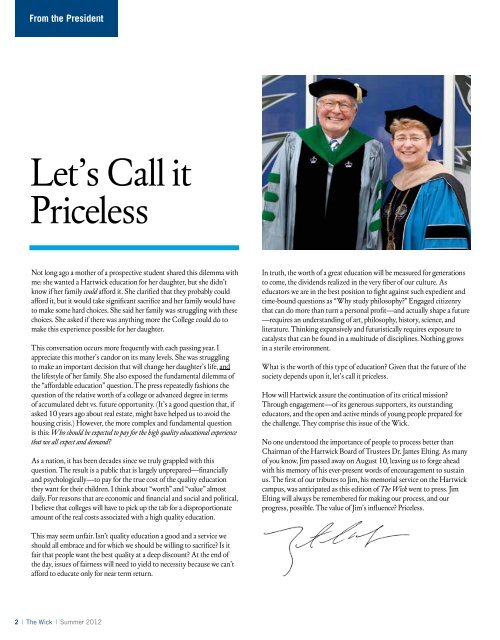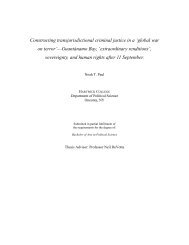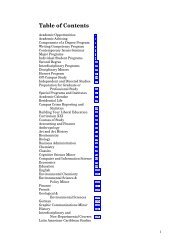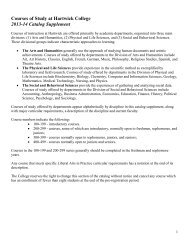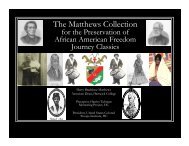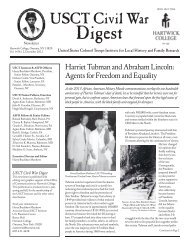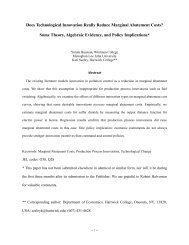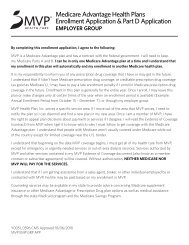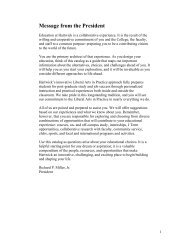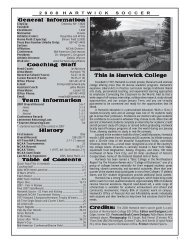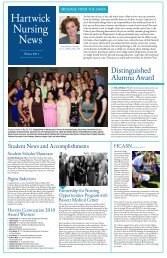Process and Progress through the Liberal Arts - Hartwick College
Process and Progress through the Liberal Arts - Hartwick College
Process and Progress through the Liberal Arts - Hartwick College
You also want an ePaper? Increase the reach of your titles
YUMPU automatically turns print PDFs into web optimized ePapers that Google loves.
From <strong>the</strong> President<br />
Let’s Call it<br />
Priceless<br />
Not long ago a mo<strong>the</strong>r of a prospective student shared this dilemma with<br />
me: she wanted a <strong>Hartwick</strong> education for her daughter, but she didn’t<br />
know if her family could afford it. She clarified that <strong>the</strong>y probably could<br />
afford it, but it would take significant sacrifice <strong>and</strong> her family would have<br />
to make some hard choices. She said her family was struggling with <strong>the</strong>se<br />
choices. She asked if <strong>the</strong>re was anything more <strong>the</strong> <strong>College</strong> could do to<br />
make this experience possible for her daughter.<br />
This conversation occurs more frequently with each passing year. I<br />
appreciate this mo<strong>the</strong>r’s c<strong>and</strong>or on its many levels. She was struggling<br />
to make an important decision that will change her daughter’s life, <strong>and</strong><br />
<strong>the</strong> lifestyle of her family. She also exposed <strong>the</strong> fundamental dilemma of<br />
<strong>the</strong> “affordable education” question. The press repeatedly fashions <strong>the</strong><br />
question of <strong>the</strong> relative worth of a college or advanced degree in terms<br />
of accumulated debt vs. future opportunity. (It’s a good question that, if<br />
asked 10 years ago about real estate, might have helped us to avoid <strong>the</strong><br />
housing crisis.) However, <strong>the</strong> more complex <strong>and</strong> fundamental question<br />
is this: Who should be expected to pay for <strong>the</strong> high quality educational experience<br />
that we all expect <strong>and</strong> dem<strong>and</strong>?<br />
As a nation, it has been decades since we truly grappled with this<br />
question. The result is a public that is largely unprepared—financially<br />
<strong>and</strong> psychologically—to pay for <strong>the</strong> true cost of <strong>the</strong> quality education<br />
<strong>the</strong>y want for <strong>the</strong>ir children. I think about “worth” <strong>and</strong> “value” almost<br />
daily. For reasons that are economic <strong>and</strong> financial <strong>and</strong> social <strong>and</strong> political,<br />
I believe that colleges will have to pick up <strong>the</strong> tab for a disproportionate<br />
amount of <strong>the</strong> real costs associated with a high quality education.<br />
This may seem unfair. Isn’t quality education a good <strong>and</strong> a service we<br />
should all embrace <strong>and</strong> for which we should be willing to sacrifice? Is it<br />
fair that people want <strong>the</strong> best quality at a deep discount? At <strong>the</strong> end of<br />
<strong>the</strong> day, issues of fairness will need to yield to necessity because we can’t<br />
afford to educate only for near term return.<br />
2 | The Wick | Summer 2012<br />
In truth, <strong>the</strong> worth of a great education will be measured for generations<br />
to come, <strong>the</strong> dividends realized in <strong>the</strong> very fiber of our culture. As<br />
educators we are in <strong>the</strong> best position to fight against such expedient <strong>and</strong><br />
time-bound questions as “Why study philosophy?” Engaged citizenry<br />
that can do more than turn a personal profit—<strong>and</strong> actually shape a future<br />
—requires an underst<strong>and</strong>ing of art, philosophy, history, science, <strong>and</strong><br />
literature. Thinking expansively <strong>and</strong> futuristically requires exposure to<br />
catalysts that can be found in a multitude of disciplines. Nothing grows<br />
in a sterile environment.<br />
What is <strong>the</strong> worth of this type of education? Given that <strong>the</strong> future of <strong>the</strong><br />
society depends upon it, let’s call it priceless.<br />
How will <strong>Hartwick</strong> assure <strong>the</strong> continuation of its critical mission?<br />
Through engagement—of its generous supporters, its outst<strong>and</strong>ing<br />
educators, <strong>and</strong> <strong>the</strong> open <strong>and</strong> active minds of young people prepared for<br />
<strong>the</strong> challenge. They comprise this issue of <strong>the</strong> Wick.<br />
No one understood <strong>the</strong> importance of people to process better than<br />
Chairman of <strong>the</strong> <strong>Hartwick</strong> Board of Trustees Dr. James Elting. As many<br />
of you know, Jim passed away on August 10, leaving us to forge ahead<br />
with his memory of his ever-present words of encouragement to sustain<br />
us. The first of our tributes to Jim, his memorial service on <strong>the</strong> <strong>Hartwick</strong><br />
campus, was anticipated as this edition of The Wick went to press. Jim<br />
Elting will always be remembered for making our process, <strong>and</strong> our<br />
progress, possible. The value of Jim’s influence? Priceless.


